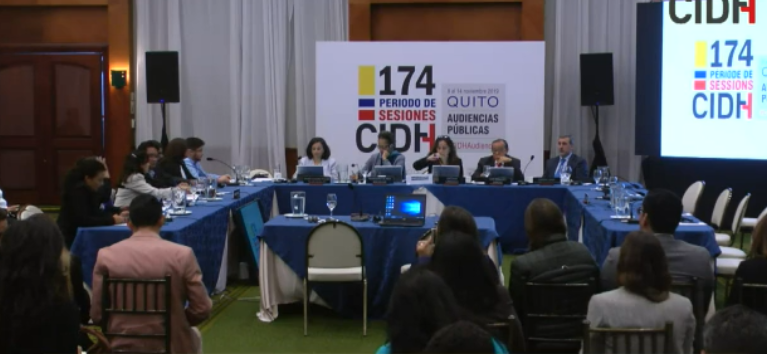Civil society organizations expose the lack of independence of the Nicaraguan judicial system to IACHR Commissioners
Quito, Ecuador, November 11, 2019. During the 174th period of sessions of the IACHR, nine civil society organizations exposed the deep deterioration of judicial independence in Nicaragua, where the courts […]

Quito, Ecuador, November 11, 2019. During the 174th period of sessions of the IACHR, nine civil society organizations exposed the deep deterioration of judicial independence in Nicaragua, where the courts have failed to guarantee the rights of Nicaraguans to access to justice, due process and judicial guarantees in the context of the democratic crisis that began on April 18, 2018.
During the hearing “Challenges for judicial autonomy and independence in Nicaragua”, the organizations highlighted how the Nicaraguan judiciary was brought into the government’s scheme to violate human rights, facilitating the criminalization of protest and the work of human rights defenders and generating conditions that guarantee impunity for human rights violations perpetrated by regime officials.
“In Nicaragua, there is no independence or autonomy of powers. The co-optation of the judiciary by the Ortega-Murillo regime has led to its acting under party control, built through tarnished selection processes and appointments, with the absence of publicity, transparency and citizen participation; privileging political affinity over appointment according to merits and professional capacities that guarantee a judiciary that is objective, independent and subject to the rule of law,” said Georgina Ruiz, of the Nicaraguan Center for Human Rights (CENIDH, for its initials in Spanish).
The culpability of the National Police, the National Prosecuting Authority and the Institute of Forensic Medicine for not complying with their obligations, allowing the commission of human rights violations and facilitating impunity for violations committed by the State or paramilitary groups was also denounced.
An absent state
As usual during recent IACHR hearings, the Nicaraguan state did not attend the appointment. For the organizations, this exemplifies how the Ortega regime continues to deny its responsibility in the serious human rights crisis that the country is facing, as well as its obligation to guarantee the autonomy and independence of the justice institutions.
“Once again, we regret the absence of the State of Nicaragua, which did not send any information to justify it, as has happened before,” said Commissioner Antonia Urrejola at the beginning of her speech. Urrejola especially greeted the mothers of murdered youth and the victims who attended the hearing, recognizing the hard work they do in pursuit of justice and non-repetition.
By the end of the hearing, the organizations requested that IACHR urge the State of Nicaragua to:
- Cease repression and criminalization; and guarantee the full exercise of human rights, including access to justice for victims of murder, torture and rape.
- Restore the full constitutional guarantees for the exercise of citizens’ rights.
- Return seized or stolen property to all victims of repression.
- Resolve the amparo appeals presented by the organizations that were repressed during the crisis (an amparo procedure is a request for a legal ruling that protects basic rights)
- Guarantee the autonomy and independence of the judicial institutions their adherence to the procedures established in the Constitution of the Republic of Nicaragua and international human rights treaties, as well as the ratification of specific international instruments, including those related to the administration of justice.
The hearing was convened by CENIDH, the Center for Justice and International Law (CEJIL), the Nicaragua Never+ Human Rights Collective, the Mesoamerican Initiative for Women Human Rights Defenders (IM-Defenders), the Nicaraguan Initiative for Human Rights Defenders (IND), the International Institute on Race, Equality and Human Rights (Race and Equality), JASS Mesoamerica, the Autonomous Movement of Women-Nicaragua (MAM- Nicaragua) and the Legal Defense Unit of Nicaragua.

